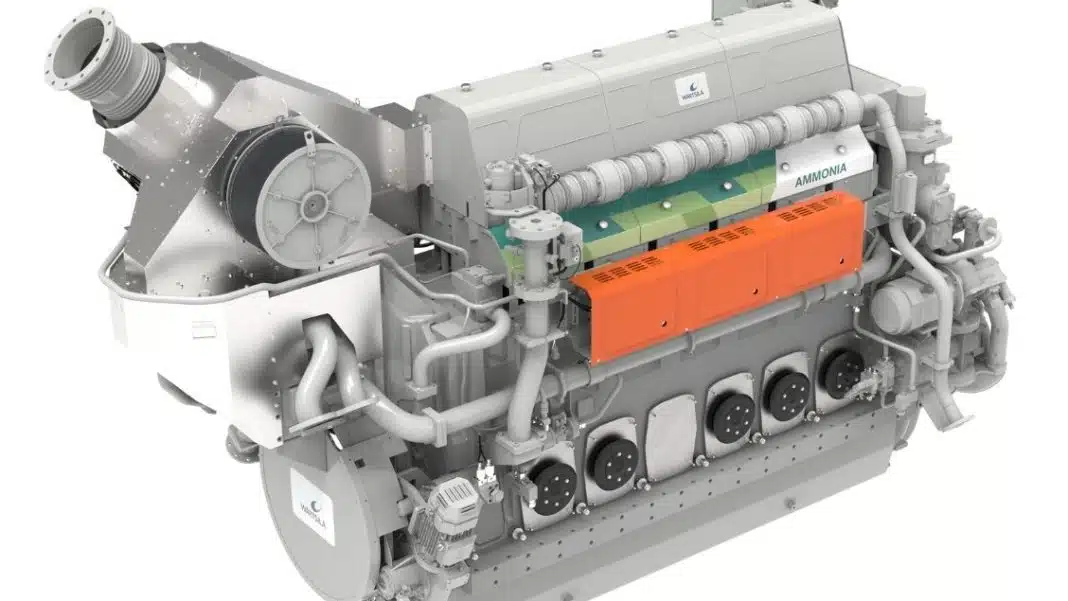Technology group Wärtsilä has introduced the marine sector’s first commercially available 4-stroke engine-based solution for ammonia fuel. The new solution enables a significant advance in sustainable shipping operations – during a time in which ship owners are seeking viable options among green fuels. The ammonia solution is now commercially available as part of the Wärtsilä 25 engine platform, which was launched in September 2022.
Viridis Bulk Carriers, the World’s first zero emission shipping company, is intended to be the first shipowner to benefit from the new ammonia solution. The company is a partnership between Amon Maritime, Mosvolds Rederi and Navigare Logistics. Earlier this month, Wärtsilä and Viridis Bulk Carriers signed a Letter of Intent for the Wärtsilä 25 ammonia engine solution, targeting to sign a commercial contract in early 2024. Viridis Bulk Carriers is bringing a ‘green game changer’ to the European short sea bulk market, planning a carbon free transportation service based on a series of ammonia-powered newbuild vessels.
“The maritime industry must significantly reduce its emissions if we are to succeed in reaching the goals set in the Paris agreement. The adoption of new technologies and ammonia as a carbon free fuel is central to this,” said André Risholm, Board member at Viridis Bulk Carriers. “We are delighted to partner with Wärtsilä on another important milestone for our ammonia-powered short sea bulk vessels.”
Håkan Agnevall, President and CEO of Wärtsilä said: “Wärtsilä is a leader in shaping the decarbonisation of marine and energy industries. This industry-leading solution is yet another flagship moment in Wärtsilä’s extensive programme to ensure future marine fuels are both viable and safe. Working in partnership with Viridis Bulk Carriers, we take the next step in our decarbonisation journey, enabling the transition to greener fuels and accelerating towards net-zero emissions shipping.”
In addition to the engine, the full solution includes an AmmoniaPac fuel gas supply system, the Wärtsilä Ammonia Release Mitigation System (WARMS), and the Wärtsilä NOx Reducer (NOR) for optimal exhaust after-treatment. Safety and efficiency are central to the solution design, maximised by a highly sophisticated automation system and maintenance agreement to ensure safe and efficient onboard operations. The safe and smooth adoption of ammonia as a new fuel for crew members is further supported by dedicated training and 24/7 global support.
“The ammonia solution is based on Wärtsilä’s well-proven LNG system, from which we have gained invaluable experience. The Wärtsilä 25 engine has been designed for easy adoption of sustainable fuels and, now, in addition to its previous capability of operating on diesel, LNG, or on gas or liquid carbon-neutral biofuels, we are proud to add ammonia to its specifications. This makes Wärtsilä 25 a thoroughly future-proof engine platform, that combines operational efficiency with environmental sustainability.” added Roger Holm, President of Wärtsilä’s Marine Power business.
Sustainable ammonia is one of the leading candidates in shipping’s search for alternative clean fuels. This new Wärtsilä 25 Ammonia solution can immediately reduce greenhouse gas emissions by more than 70 percent, compared to a similar sized diesel solution, meeting current EU targets until 2050 and even exceeding the IMO target for 2040.
“This is only the beginning,” continued Stefan Nysjö, Vice President of Power Supply, Wärtsilä Marine Power. “The Wärtsilä 25 is the first Wärtsilä engine to run on ammonia as a fuel, and this is an important milestone, but we do not stop here. While we are planning for additional ammonia engines in our portfolio over time, we are also committed to continue development and testing of technologies and solutions that can continue to support the industry with reducing greenhouse gas emissions even further in the future.”












